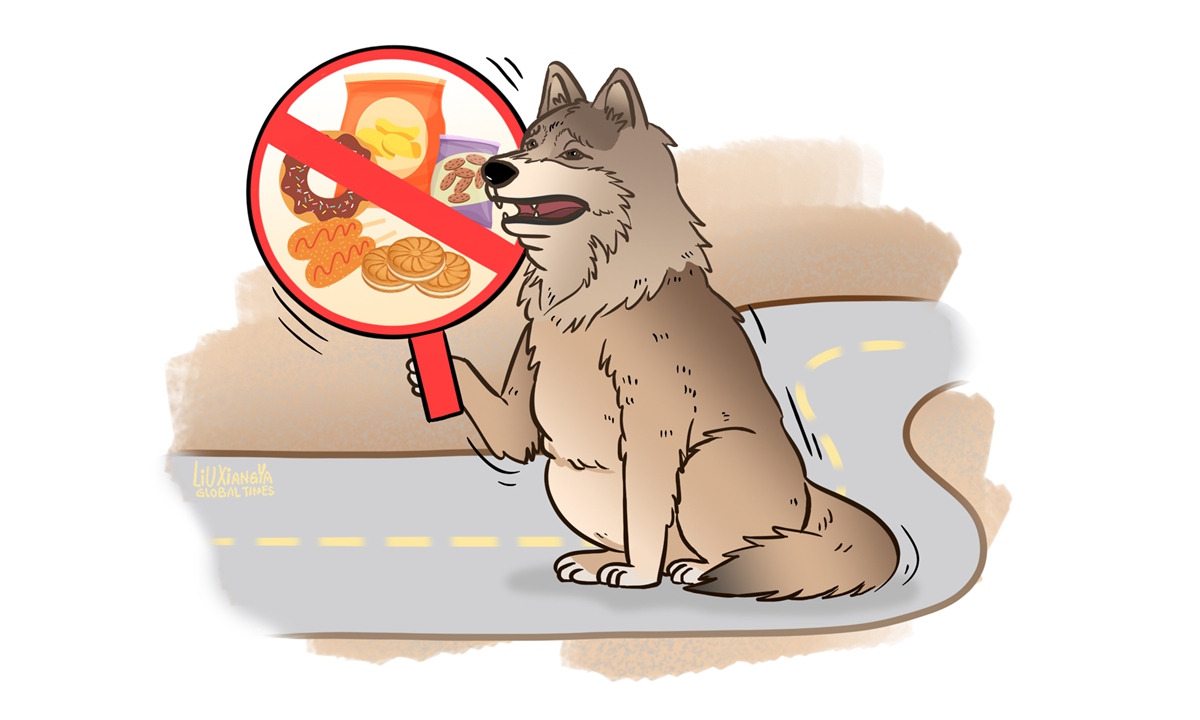
Illustration: Liu Xiangya/GT
Over the past year, wild wolves in Hoh Xil, Northwest China's Qinghai Province, became internet celebrities for approaching people for food. Many tourists have flocked to the area to feed the wolves, leading to wolves cease hunting. As feeding pose health risks to wolves while further disrupt the plateau ecosystem, maintaining a distance is the best way to protect wildlife.
On October 1, Wei Xue, a tourist from Suzhou, East China's Jiangsu Province, encountered two wolves near roadside marker 2990 on National Highway 109, followed by two more as they continued their journey. "There were so many cars parked around the wolves," Wei told the Global Times on Tuesday. "Across the way, I saw two wolves eating eggs tossed by tourists. They were visibly plump, and when tourists fed them sausages, they eagerly accepted and showed no fear of humans."
Wei also noted that each wolf she encountered was surrounded by an average of five vehicles, with tourists primarily feeding them eggs and sausages. These wolves thus lost their need to hunt for food.
With these increasing feeding chances, the number of wolf packs seeking food is also growing, turning remote protected zones into traffic-jammed photo-op sites. Though tourists may feel satisfied with feeding, respecting boundaries and refraining from feeding or disturbing wildlife should be the fundamental way to coexist harmoniously with nature.
Lian Xinming, a researcher at the Northwest Institute of Plateau Biology under the Chinese Academy of Sciences, told the Global Times that food fed by humans contains excessive salt, particularly items like sausages and cured meat, which is unhealthy for wolves.
"Wolves primarily consume raw food in their natural diet. Continuous feeding on human food will pose health risks, increasing the chances of illness over time while also reducing their hunting skills," Lian said.
He further noted that wolves play a critical role in the highland grasslands food chain as primary predators. As wolves cease hunting, the number of herbivores could increase, upsetting the ecological balance. In research conducted by his team, they found an area on the plateau along the antelope migration route that had not yet been grazed upon by antelopes had a ground biomass of only around 60 grams per square meter, indicating a fragile ecosystem.
"When more herbivores graze on the grass, the grasslands can become barren, raising the risk of desertification and ultimately damaging the entire ecosystem," Lian noted. He added that the plateau ecosystem is already delicate, and once disrupted, it is challenging to restore.
Similar incidents have also occurred in China, from "celebrity foxes" along Kanas Lake in Northwest China's Xinjiang Uygur Autonomous Region to "celebrity carp" in Baotu Spring in Jinan, East China's Shandong Province, and "celebrity pigs" in Shenzhen's Wutong Mountain in South China's Guangdong Province. In these cases, feeding wild animals by tourists led to negative impact on the environment.
In fact, various scenic areas and governments have long warned tourists against feeding wildlife.
According to the People's Daily, the Hoh Xil Forest Public Security Bureau has beefed up patrols in key areas, urging travelers to avoid stopping and feeding wild animals.
An announcement released on the Sanjiangyuan National Park official Wechat account three months ago prohibited visitors from feeding wild animals. The notice warned that human food can damage animals' natural foraging instincts, hinder their survival abilities, and even cause loss of their wild nature, potentially disrupting population balance and spreading diseases.
However, the announcement has had limited effect in curbing the behavior of some tourists.
How can stronger restrictions be enforced against feeding wildlife?
The Wildlife Protection Law in China explicitly prohibits "acts that interfere with or threaten the survival and reproduction of wild animals within protected natural areas." However, there is still debate on whether feeding qualifies as interference or a threat. Policymakers may need to refine the law, adding clear measures to address this issue effectively.
Some places have already issued local regulations prohibiting the feeding of wildlife in natural environments. Certain scenic areas have introduced a "blacklist" for tourists, barring those who feed wild animals. The Shenshuping Base of Wolong Giant Panda Reserve on Thursday issued a notice banning a visitor, surnamed Zhou, who threw fruit into the panda enclosure, from ever entering the base again, according to an announcement released on its official Wechat account.
Lian noted that in the context of high visitor traffic, it becomes challenging for local authorities to manage things efficiently. In addition to promoting education, it is important to increase the cost of such acts. Future considerations could also include advancing punitive measures through legislation and fines.




